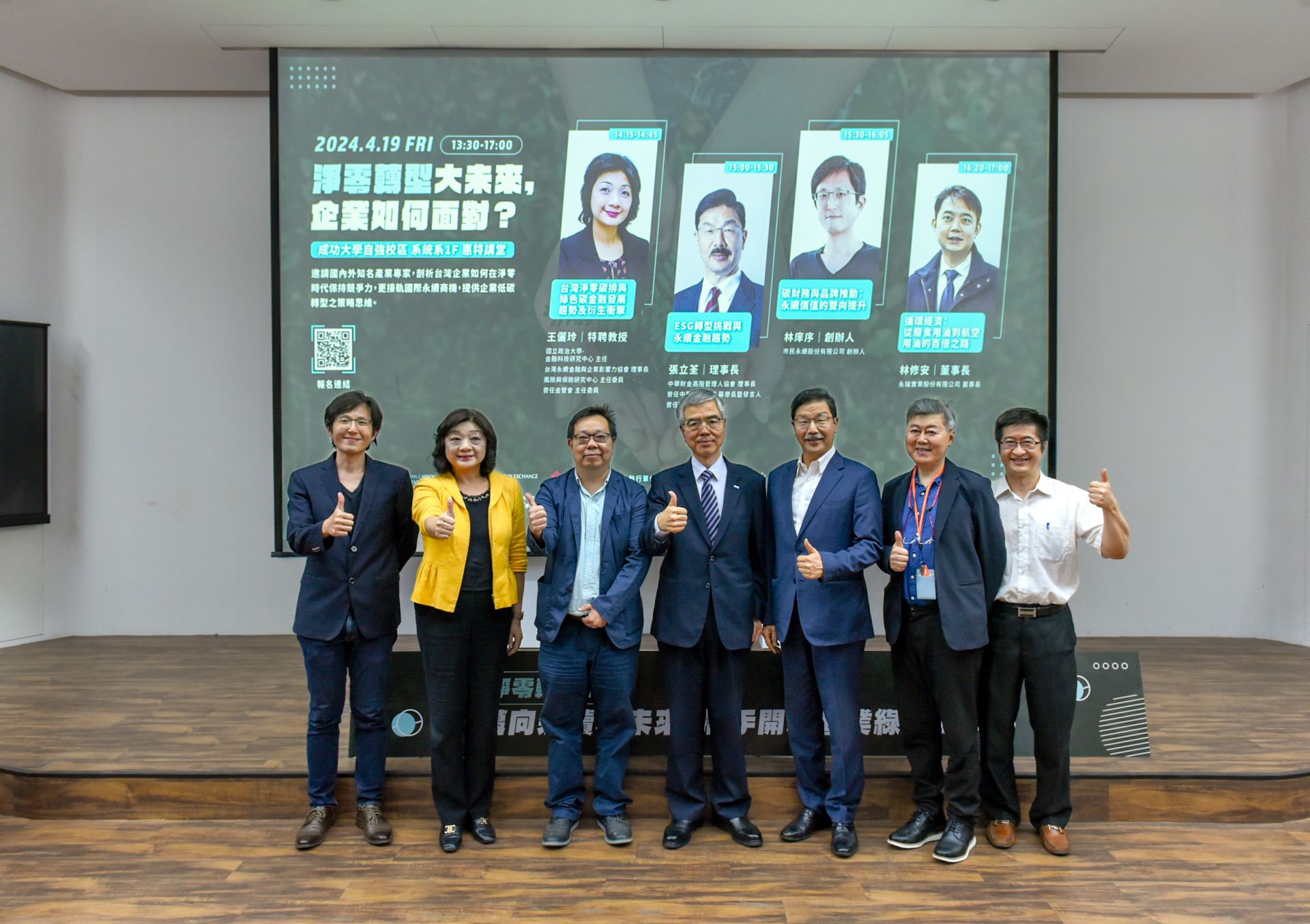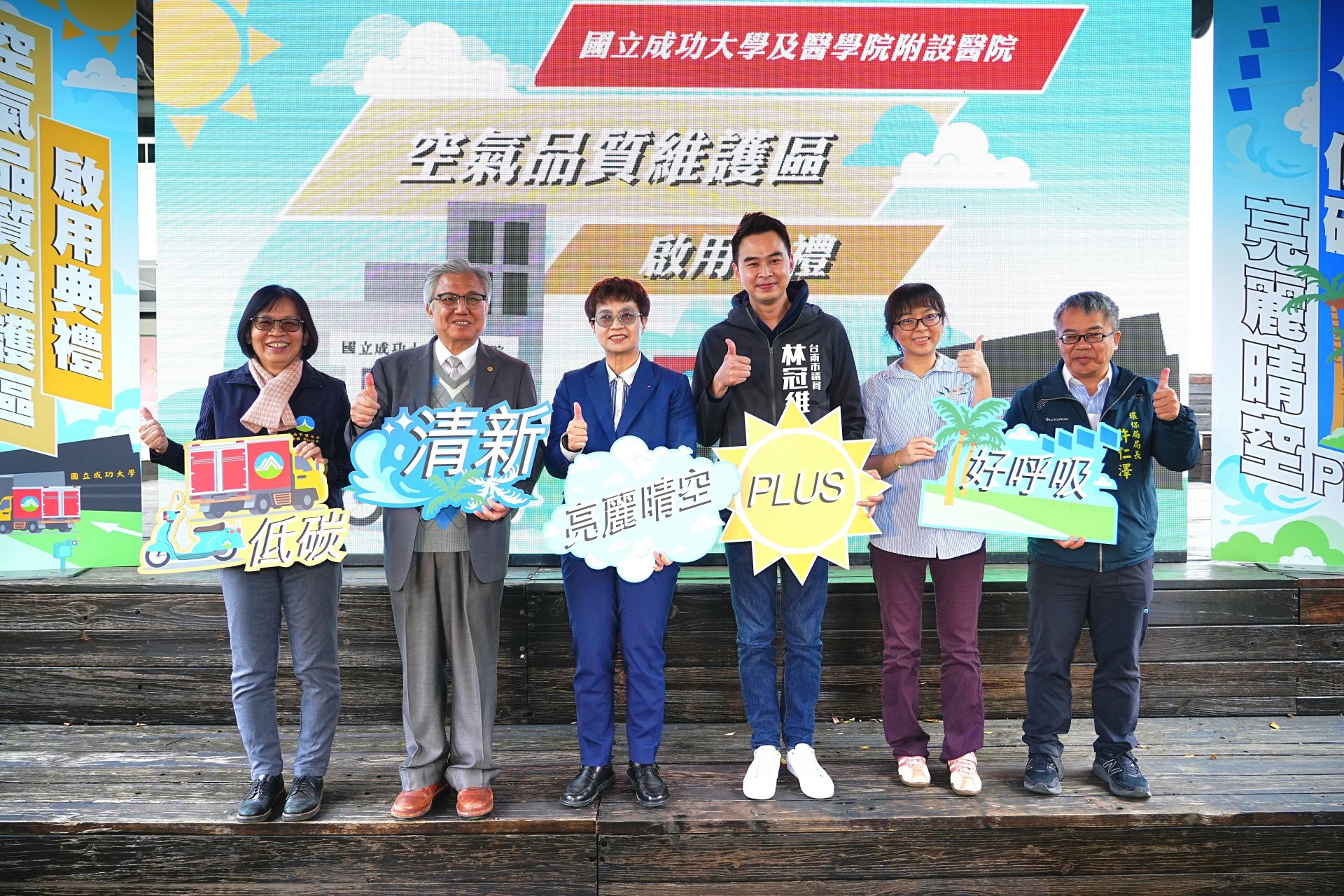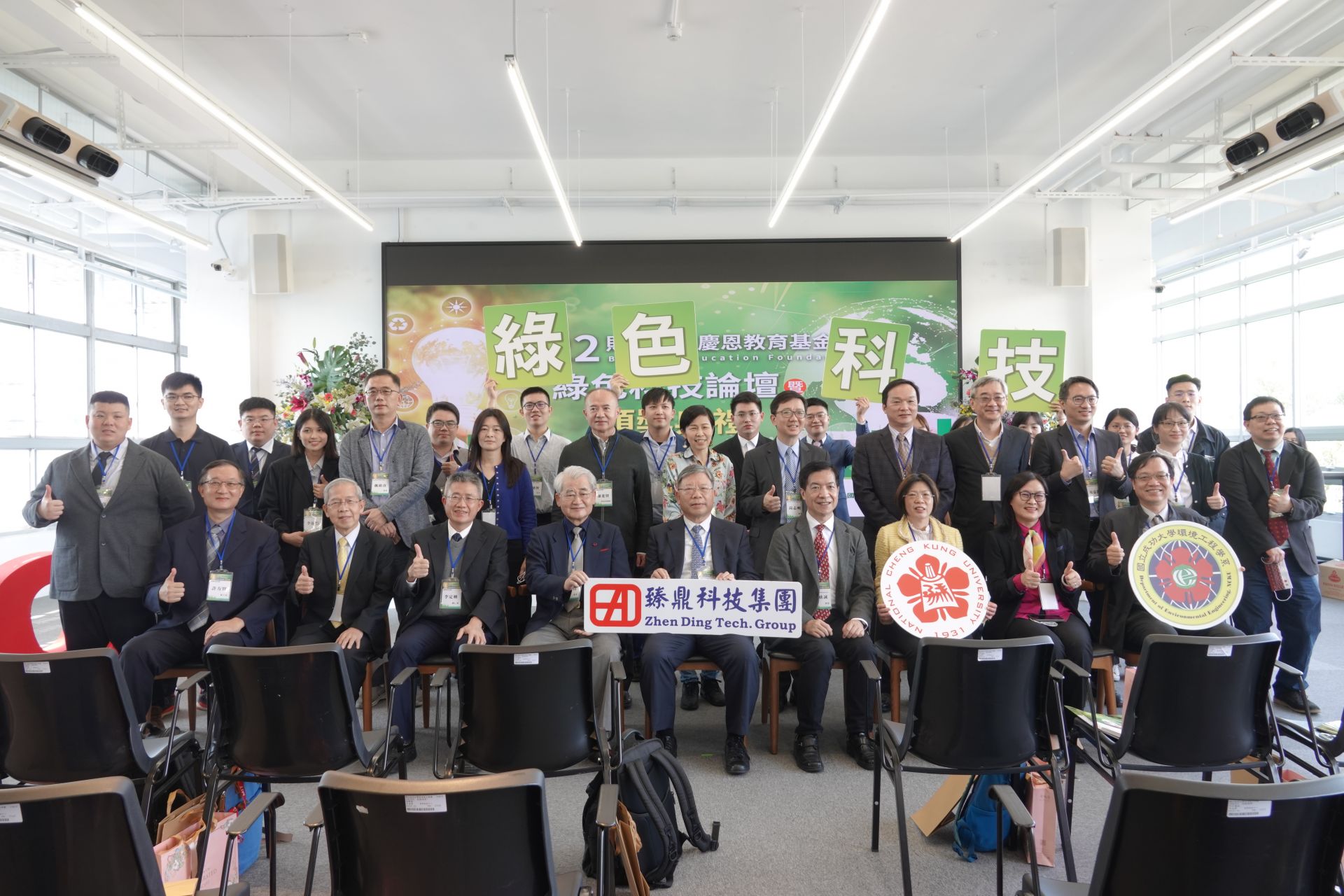SDG13
NCKU partners with Taiwan Stock Exchange and Carbon Exchange for a forum on transitioning to net zero
National Cheng Kung University (NCKU), in collaboration with the Taiwan Stock Exchange and the Taiwan Carbon Exchange, jointly held the "Transition to Net Zero: How Enterprises Face the Future" forum on April 19th. Renowned scholars and experts from Taiwan were invited to speak at NCKU, analyzing the trends in net zero carbon emissions development and the emergence of circular economy businesses. The event attracted over 200 business professionals and young scholars, generating enthusiastic responses.
Held at the Huat Hsi Lecture Hall on the NCKU campus, Mr. Tsung-Pu Yu, Manager of the Corporate Governance Department of the Taiwan Stock Exchange, expressed that to assist enterprises in transitioning to net zero, the stock exchange, as a vital platform in the capital market, cooperates with regulatory authorities' sustainable development policies. They integrate securities-related units, listed companies, investors, intermediary institutions, other market participants, and academic institutions/NGOs to jointly construct an ESG sustainable ecosystem. This aims to provide enterprises with more proactive net zero governance strategies. Through eight concrete action measures such as building an integrated ESG information platform, promoting ESG evaluation, facilitating diversified ESG product development, assisting enterprises in carbon inventories and disclosure, conducting talent cultivation, and establishing a carbon trading platform, they aim to incentivize carbon reduction, promote talent development, and drive green circular economy.
Liang-Ming Whang, Director of the Industrial Collaboration and Innovation Center at NCKU, expressed gratitude for the support from the Taiwan Stock Exchange. Joining hands with NCKU's Great South Scientific Research Industrialization Platform and NCKU's on-campus net zero carbon emission research and teaching units, the forum and courses aim to provide services and assistance to enterprises in the field of net zero carbon emissions. Huang stated that net zero carbon emissions are not only a current trend but also a movement towards a new way of life for all. Various courses related to net zero carbon emissions are blooming all over Taiwan, and they generally encompass four stages: carbon inventory, energy-saving carbon reduction diagnosis, introduction of advanced technology, and investment in future technologies with potential. While many institutions are involved in the first stage of carbon inventory, there are not many platforms providing follow-up services such as setting reduction targets and implementing reduction strategies. Nevertheless, NCKU has gathered profound technical expertise, which will undoubtedly contribute significantly to enterprises' journey toward net zero carbon emissions.
The forum, organized by NCKU in collaboration with the Taiwan Stock Exchange and the Carbon Exchange, received co-sponsorship from multiple units within NCKU, including the Research Center for Energy Technology and Strategy, the Hierarchical Green-Energy Materials Research Center (Hi-GEM), the Center for Innovative FinTech Business Models, the Sustainable FinTech Alliance, the Sustainable Environment Research Laboratories, the Academy of Innovative Semiconductor and Sustainable Manufacturing, the Industrial Sustainable Development Center, and the Sustainable Innovation Club. They are committed to concerted efforts for net zero carbon emissions.
The forum invited scholars and experts to share the development trends and derived impacts of net zero carbon emissions. Professor Li-Ling Wang from the Department of Risk Management and Insurance at National Chengchi University gave the opening speech. She shared her research and observations on the development trends and impacts of net zero carbon emissions and green carbon finance in Taiwan. Professor Wang pointed out that after COP28, global efforts to achieve net zero carbon emissions have intensified. This has not only initiated the transition of the energy sector away from petroleum economies but also accelerated the development of low-carbon technologies and stricter disclosure regulations. She noted that the carbon trading market is divided into mandatory and voluntary markets based on carbon pricing mechanisms. Enterprises can participate in certified carbon reduction activities such as developing renewable energy, carbon capture, and natural carbon sinks, and then use the obtained carbon credits for voluntary carbon offsetting in voluntary carbon markets, thus creating value for carbon credits.
Chairman Li-Chuan Chang from the Association of Senior Financial Managers of the Republic of China analyzed Taiwan's financial sustainability and ESG transformation. He mentioned that according to statistics from PwC Taiwan, the carbon emissions of financial institutions' investment and financing portfolios are 700 times higher than those of the institutions themselves. Therefore, besides implementing concrete carbon reduction measures in their own operations, it is more important for financial institutions to take action from the perspective of investment and financing management. This includes increasing investments in green industries, reducing carbon emissions from investment and financing portfolios, and accelerating the promotion of green finance and products. Achieving the vision of sustainable finance requires not only achieving net zero but also incorporating sustainability into operational processes and products to make sustainability strategies a competitive advantage.
Furthermore, under the trend of net zero carbon emissions, opportunities for circular economy development have emerged, which are deeply meaningful for sustainability and innovation. Xiang-Xu Lin, founder of GreenHope, pointed out that Citizens' Sustainability applies blockchain Web 3.0 technology to help individuals transform their personal green-friendly behavior data into data asset rights in a "personal carbon wallet." This can enable individuals to receive rewards provided by enterprises and obtain green marketing points from businesses, thereby enhancing public participation in carbon finance innovation services.
YoungRay Co., Ltd., which started with recycling waste cooking oil, Chairman Xiu-An Lin's nearly 30-year career has been closely linked to "oil." As early as university, he developed Taiwan's first drop of bio-diesel and continued his research at the Industrial Technology Research Institute's Material and Chemical Institute. He pointed out that the Carbon Offsetting and Reduction Scheme for International Aviation (CORSIA) stipulates that from 2027, airlines with international operations must provide sustainable aviation fuel (SAF) certified by governments or independent organizations to airlines in their own and other countries. The estimated global SAF demand in 2030 is 55 million metric tons. However, in 2022, only 6.84 million metric tons of SAF produced from waste cooking oil were globally, and it is estimated that even by 2026, when SAF production capacity is expected to reach 9.9 million metric tons, it can only meet less than 20% of the demand in 2030. Active measures are urgently needed to address the severe shortage of SAF.
NCKU, in collaboration with the Taiwan Stock Exchange and the Carbon Exchange, has initiated the first part of cooperation with the net zero carbon emissions forum. In the second half of the year, a second forum is planned with the theme "Key Technologies for Net Zero." It will invite heavyweight speakers from industry, academia, and research to discuss key net zero technologies. Additionally, NCKU and the Taiwan Stock Exchange plan to offer a 10-day course, divided into two categories: international standard norms and greenhouse gas management, and net zero technology and carbon reduction design, totaling seven courses to cultivate talent for net zero carbon emissions in Taiwan.
Held at the Huat Hsi Lecture Hall on the NCKU campus, Mr. Tsung-Pu Yu, Manager of the Corporate Governance Department of the Taiwan Stock Exchange, expressed that to assist enterprises in transitioning to net zero, the stock exchange, as a vital platform in the capital market, cooperates with regulatory authorities' sustainable development policies. They integrate securities-related units, listed companies, investors, intermediary institutions, other market participants, and academic institutions/NGOs to jointly construct an ESG sustainable ecosystem. This aims to provide enterprises with more proactive net zero governance strategies. Through eight concrete action measures such as building an integrated ESG information platform, promoting ESG evaluation, facilitating diversified ESG product development, assisting enterprises in carbon inventories and disclosure, conducting talent cultivation, and establishing a carbon trading platform, they aim to incentivize carbon reduction, promote talent development, and drive green circular economy.
Liang-Ming Whang, Director of the Industrial Collaboration and Innovation Center at NCKU, expressed gratitude for the support from the Taiwan Stock Exchange. Joining hands with NCKU's Great South Scientific Research Industrialization Platform and NCKU's on-campus net zero carbon emission research and teaching units, the forum and courses aim to provide services and assistance to enterprises in the field of net zero carbon emissions. Huang stated that net zero carbon emissions are not only a current trend but also a movement towards a new way of life for all. Various courses related to net zero carbon emissions are blooming all over Taiwan, and they generally encompass four stages: carbon inventory, energy-saving carbon reduction diagnosis, introduction of advanced technology, and investment in future technologies with potential. While many institutions are involved in the first stage of carbon inventory, there are not many platforms providing follow-up services such as setting reduction targets and implementing reduction strategies. Nevertheless, NCKU has gathered profound technical expertise, which will undoubtedly contribute significantly to enterprises' journey toward net zero carbon emissions.
The forum, organized by NCKU in collaboration with the Taiwan Stock Exchange and the Carbon Exchange, received co-sponsorship from multiple units within NCKU, including the Research Center for Energy Technology and Strategy, the Hierarchical Green-Energy Materials Research Center (Hi-GEM), the Center for Innovative FinTech Business Models, the Sustainable FinTech Alliance, the Sustainable Environment Research Laboratories, the Academy of Innovative Semiconductor and Sustainable Manufacturing, the Industrial Sustainable Development Center, and the Sustainable Innovation Club. They are committed to concerted efforts for net zero carbon emissions.
The forum invited scholars and experts to share the development trends and derived impacts of net zero carbon emissions. Professor Li-Ling Wang from the Department of Risk Management and Insurance at National Chengchi University gave the opening speech. She shared her research and observations on the development trends and impacts of net zero carbon emissions and green carbon finance in Taiwan. Professor Wang pointed out that after COP28, global efforts to achieve net zero carbon emissions have intensified. This has not only initiated the transition of the energy sector away from petroleum economies but also accelerated the development of low-carbon technologies and stricter disclosure regulations. She noted that the carbon trading market is divided into mandatory and voluntary markets based on carbon pricing mechanisms. Enterprises can participate in certified carbon reduction activities such as developing renewable energy, carbon capture, and natural carbon sinks, and then use the obtained carbon credits for voluntary carbon offsetting in voluntary carbon markets, thus creating value for carbon credits.
Chairman Li-Chuan Chang from the Association of Senior Financial Managers of the Republic of China analyzed Taiwan's financial sustainability and ESG transformation. He mentioned that according to statistics from PwC Taiwan, the carbon emissions of financial institutions' investment and financing portfolios are 700 times higher than those of the institutions themselves. Therefore, besides implementing concrete carbon reduction measures in their own operations, it is more important for financial institutions to take action from the perspective of investment and financing management. This includes increasing investments in green industries, reducing carbon emissions from investment and financing portfolios, and accelerating the promotion of green finance and products. Achieving the vision of sustainable finance requires not only achieving net zero but also incorporating sustainability into operational processes and products to make sustainability strategies a competitive advantage.
Furthermore, under the trend of net zero carbon emissions, opportunities for circular economy development have emerged, which are deeply meaningful for sustainability and innovation. Xiang-Xu Lin, founder of GreenHope, pointed out that Citizens' Sustainability applies blockchain Web 3.0 technology to help individuals transform their personal green-friendly behavior data into data asset rights in a "personal carbon wallet." This can enable individuals to receive rewards provided by enterprises and obtain green marketing points from businesses, thereby enhancing public participation in carbon finance innovation services.
YoungRay Co., Ltd., which started with recycling waste cooking oil, Chairman Xiu-An Lin's nearly 30-year career has been closely linked to "oil." As early as university, he developed Taiwan's first drop of bio-diesel and continued his research at the Industrial Technology Research Institute's Material and Chemical Institute. He pointed out that the Carbon Offsetting and Reduction Scheme for International Aviation (CORSIA) stipulates that from 2027, airlines with international operations must provide sustainable aviation fuel (SAF) certified by governments or independent organizations to airlines in their own and other countries. The estimated global SAF demand in 2030 is 55 million metric tons. However, in 2022, only 6.84 million metric tons of SAF produced from waste cooking oil were globally, and it is estimated that even by 2026, when SAF production capacity is expected to reach 9.9 million metric tons, it can only meet less than 20% of the demand in 2030. Active measures are urgently needed to address the severe shortage of SAF.
NCKU, in collaboration with the Taiwan Stock Exchange and the Carbon Exchange, has initiated the first part of cooperation with the net zero carbon emissions forum. In the second half of the year, a second forum is planned with the theme "Key Technologies for Net Zero." It will invite heavyweight speakers from industry, academia, and research to discuss key net zero technologies. Additionally, NCKU and the Taiwan Stock Exchange plan to offer a 10-day course, divided into two categories: international standard norms and greenhouse gas management, and net zero technology and carbon reduction design, totaling seven courses to cultivate talent for net zero carbon emissions in Taiwan.

From left: Xiang-Xu Lin, founder of GreenHope; Professor Li-Ling Wang from National Chengchi University; Dr. Liang-Ming Whang, Director of the Industrial Collaboration and Innovation Center at NCKU; Manager Tsung-Pu Yu from the Corporate Governance Department of the Taiwan Stock Exchange; Chairman Li-Chuan Chang from the Financial Executives Institute; Executive Director Sheng-Wei Peng from the Great South Scientific Research Industrialization Platform at NCKU; and Dr. Tian-Zhuo Lin from the Industrial Collaboration and Innovation Center at NCKU.

NCKU Collaborates with the Taiwan Stock Exchange and Carbon Exchange to Host Net Zero Transition Forum, Generating Enthusiastic Response.

SDG13The city government and NCKU collaborate to establish Tainan City's third air quality maintenance zone.
View more
SDG13Electronic Paper Applications in Sustainable Campuses: "The Future of Paper" Brings Imagination to Reality
View more



















